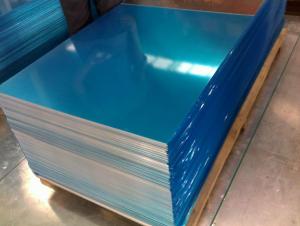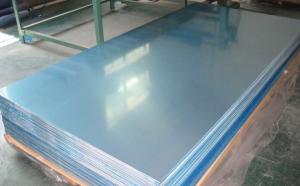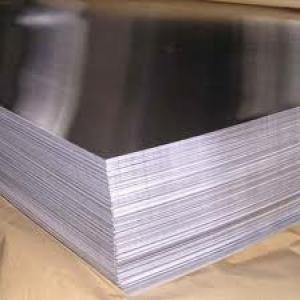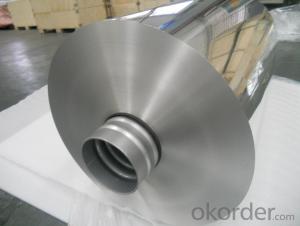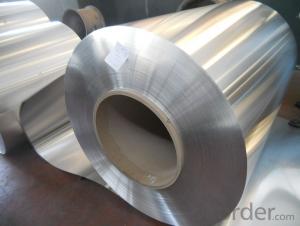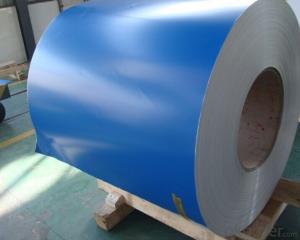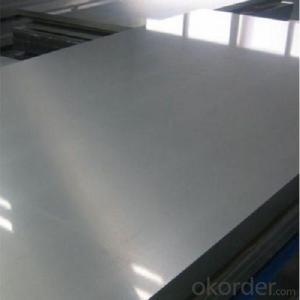Aluminum Sheets 8XXX Mill Finished
- Loading Port:
- China Main Port
- Payment Terms:
- TT or LC
- Min Order Qty:
- 8 m.t.
- Supply Capability:
- 10000 tons m.t./month
OKorder Service Pledge
OKorder Financial Service
You Might Also Like
1.Structure of Aluminum Sheets 8xxx Mill Finished Description:
Aluminum sheets 8xxx mill finished is cut from aluminum coils 8xxx. Aluminum sheets 8xxx mill finished have great ductility, heat conductivity, anti-corrosion and moisture resistance properties.
Aluminum sheets 8xxx mill finished is widely used for electronics, instruments, lighting decoration, packing industry, house decoration, curtain wall, honeycomb-core panel, sandwich panel, aluminum composite panel and aluminum composite pipes.
2.Main Features of the Aluminum Sheets 8xxx Mill Finished:
• Superior quality of raw material
• Reasonable and stable chemical composition
• Accurate tolerance
• Goode mechanical property
3.Aluminum Sheets 8xxx Mill Finished Images
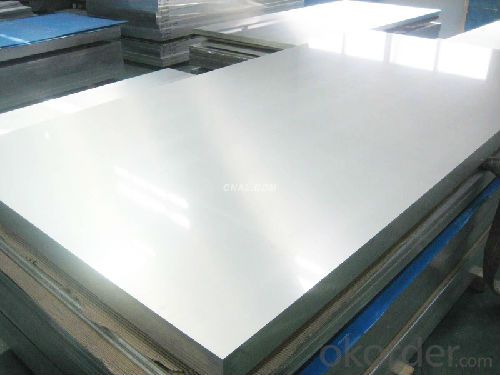
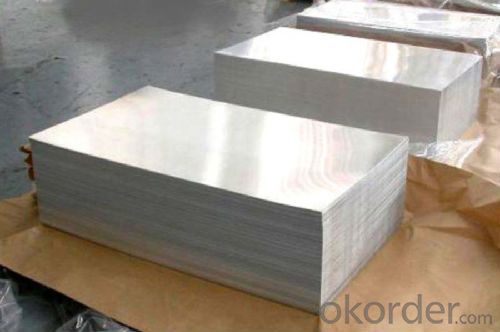
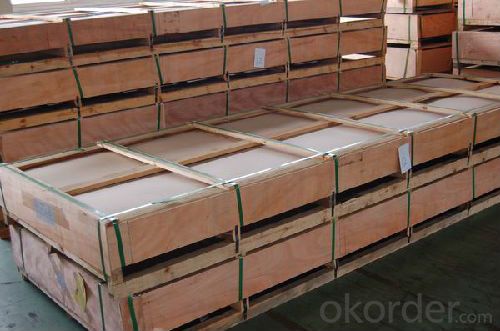
4.Aluminum Sheets 8xxx Mill Finished Specification
| Alloy | AA8xxx (AA8011, AA8006 etc) |
| Temper | H14,H16,H18,H22,H24,H26,H32,O/F |
| Thickness | 0.2mm--100mm |
| Width | 30mm--1700mm |
| Standard | GB/T 3880-2006 |
5. FAQ of Aluminum Sheets 8xxx Mill Finished
A.How to guarantee the quality?
Customers are welcome to our mill to visit and check the products. Besides, we can arrange a third party to test the aluminum sheets 8xxx mill finished products.
B. What is the MOQ?
The MOQ of aluminum sheets 8xxx mill finished is 7-8 tons for each size.
- Q:What is the fatigue life of aluminum sheets?
- The fatigue life of aluminum sheets refers to the number of cycles that the material can withstand before failure occurs under cyclic loading conditions. The fatigue life of aluminum sheets can vary depending on various factors such as the alloy composition, thickness, surface finish, loading conditions, and environmental factors. Aluminum is known for its relatively high fatigue strength compared to other materials, making it a popular choice in various industries including aerospace, automotive, and construction. The fatigue life of aluminum sheets is typically influenced by the presence of microstructural defects such as inclusions, voids, and grain boundaries. To determine the fatigue life of aluminum sheets, fatigue tests are conducted using standardized procedures such as ASTM E466 or ASTM E606. These tests involve subjecting the material to cyclic loading conditions, typically at a constant stress or strain amplitude, while monitoring the number of cycles required for failure to occur. The results are then used to generate an S-N curve, which represents the relationship between the applied stress or strain amplitude and the number of cycles to failure. The S-N curve provides valuable information about the fatigue life of aluminum sheets, indicating the stress or strain levels at which the material can withstand a certain number of cycles before failure. It is important to note that the fatigue life of aluminum sheets can be improved through various methods such as alloying, heat treatment, surface treatment, and proper design considerations. In conclusion, the fatigue life of aluminum sheets is a critical factor to consider when designing components or structures subjected to cyclic loading conditions. Understanding the specific properties and characteristics of the aluminum alloy, along with proper testing and analysis, can help determine the fatigue life and ensure the safe and reliable performance of aluminum sheets in various applications.
- Q:How do aluminum sheets perform in terms of impact resistance?
- Aluminum sheets are known for their excellent impact resistance properties. Due to their high strength-to-weight ratio, they can withstand significant impacts without deforming or breaking easily. Additionally, aluminum has inherent toughness and flexibility, which allows it to absorb and distribute the force of an impact, minimizing the risk of damage. This makes aluminum sheets a preferred choice for applications requiring durability and resistance to impact, such as in the automotive, aerospace, and construction industries.
- Q:has aluminum sheet reacted with concentrated sulfuric acid?
- it can be regarded as no reaction, concentrated sulfuric acid will make aluminum's surface inactivation,and produce a layer of dense aluminium oxide film which will prevent further reaction.
- Q:How is the thickness of an aluminum sheet measured?
- The thickness of an aluminum sheet is typically measured using a tool called a micrometer. This handheld device applies pressure to the sheet and displays the measurement in millimeters or inches on a digital or analog gauge.
- Q:Are aluminum sheets suitable for use in HVAC (heating, ventilation, and air conditioning) systems?
- Yes, aluminum sheets are suitable for use in HVAC systems. They offer several advantages such as high thermal conductivity, corrosion resistance, and lightweight nature, making them ideal for efficient heat transfer and durability in HVAC applications.
- Q:What are the different types of alloys used for anodized aluminum sheets?
- There are several different types of alloys that can be used for anodized aluminum sheets, each with its own unique properties and applications. Some of the commonly used alloys include: 1. 1000 series alloys: These alloys are primarily made of pure aluminum and are known for their excellent corrosion resistance. They are commonly used for anodized aluminum sheets in various industries, including architecture, automotive, and aerospace. 2. 5000 series alloys: These alloys contain magnesium as the primary alloying element, which provides enhanced strength and excellent weldability. They are often used for anodized aluminum sheets in applications that require high strength and resistance to atmospheric corrosion. 3. 6000 series alloys: This series of alloys is known for its excellent combination of strength, extrudability, and corrosion resistance. The most commonly used alloy in this series for anodized aluminum sheets is 6061, which is widely used in structural components, marine applications, and consumer electronics. 4. 7000 series alloys: These alloys are known for their exceptional strength and are typically used in applications that require high-performance materials. The most common alloy in this series for anodized aluminum sheets is 7075, which is widely used in aerospace and defense industries. 5. 2000 series alloys: These alloys are primarily used in applications that require high strength and excellent fatigue resistance. They are commonly used in the aerospace industry for anodized aluminum sheets. It's important to note that the choice of alloy for anodized aluminum sheets depends on the specific requirements of the application, including desired strength, corrosion resistance, and other mechanical properties.
- Q:Are the aluminum sheets suitable for manufacturing heat exchanger tubes?
- Yes, aluminum sheets are suitable for manufacturing heat exchanger tubes. Aluminum has excellent thermal conductivity, corrosion resistance, and is lightweight, making it an ideal material for heat transfer applications.
- Q:Are aluminum sheets suitable for automotive body reinforcements?
- Yes, aluminum sheets are suitable for automotive body reinforcements. Aluminum is a lightweight material that offers high strength-to-weight ratio, making it an ideal choice for automotive applications. It provides excellent corrosion resistance, which is crucial for vehicles exposed to various weather conditions and road salts. Additionally, aluminum sheets can be easily formed and welded, allowing for seamless integration into the body structure. The use of aluminum sheets in automotive body reinforcements helps reduce the overall weight of the vehicle, leading to improved fuel efficiency and performance. Furthermore, aluminum is a recyclable material, aligning with the automotive industry's increasing focus on sustainability. Hence, aluminum sheets are indeed a suitable choice for automotive body reinforcements.
- Q:Are aluminum sheets suitable for automotive body panels?
- Yes, aluminum sheets are suitable for automotive body panels. Aluminum is lightweight, corrosion-resistant, and strong, making it an ideal material for manufacturing car body panels. It helps improve fuel efficiency, enhances performance, and reduces overall vehicle weight, making it a popular choice among automakers.
- Q:Can aluminum sheets be used for kitchen backsplashes?
- Kitchen backsplashes can indeed utilize aluminum sheets. Aluminum, a versatile and durable material, finds common use in various applications, including kitchen backsplashes. It boasts several advantages, such as its lightweight nature, resistance to corrosion, and ease of cleaning. Aluminum sheets are also easily cut and installed, making them a favored choice for contemporary kitchen designs. Moreover, they come in a wide array of finishes and colors, allowing homeowners to discover a style that complements their kitchen décor. In conclusion, aluminum sheets serve as an exceptional option for kitchen backsplashes, thanks to their practicality, aesthetic appeal, and ability to withstand the demands of a bustling kitchen environment.
1. Manufacturer Overview |
|
|---|---|
| Location | |
| Year Established | |
| Annual Output Value | |
| Main Markets | |
| Company Certifications | |
2. Manufacturer Certificates |
|
|---|---|
| a) Certification Name | |
| Range | |
| Reference | |
| Validity Period | |
3. Manufacturer Capability |
|
|---|---|
| a)Trade Capacity | |
| Nearest Port | |
| Export Percentage | |
| No.of Employees in Trade Department | |
| Language Spoken: | |
| b)Factory Information | |
| Factory Size: | |
| No. of Production Lines | |
| Contract Manufacturing | |
| Product Price Range | |
Send your message to us
Aluminum Sheets 8XXX Mill Finished
- Loading Port:
- China Main Port
- Payment Terms:
- TT or LC
- Min Order Qty:
- 8 m.t.
- Supply Capability:
- 10000 tons m.t./month
OKorder Service Pledge
OKorder Financial Service
Similar products
New products
Hot products
Related keywords
